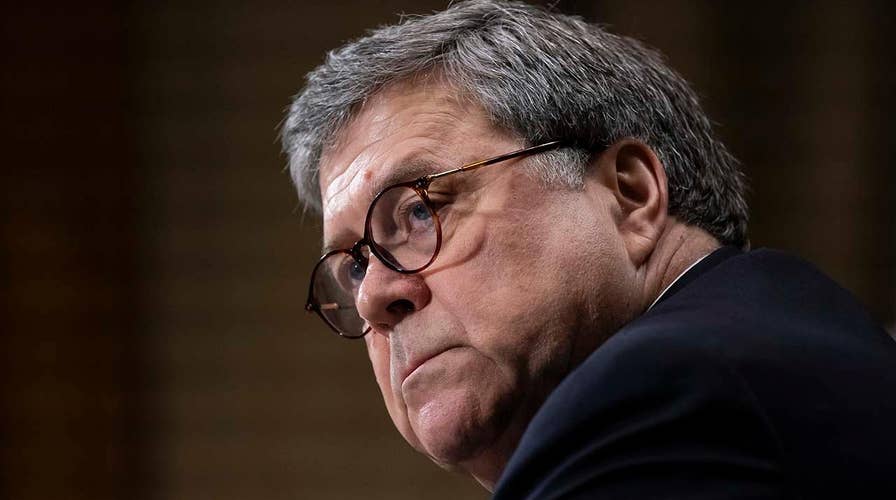The legislative and executive branches battle over Attorney General William Barr response to subpoena
Former NRSC general counsel Alex Vogel and Run for America founder David Burstein weigh in on President Trump asserting executive privilege over the release of an unredacted version of the Mueller report to Congress.
Now that the Department of Justice announced that President Trump is asserting executive privilege to protect redacted information in Special Counsel Robert Mueller's report and its underlying evidence, here is how the privilege works and how it has been used in the past.
Executive privilege allows the president to keep sensitive information away from other branches of the federal government if disclosure would interfere with the functions of the executive branch.
FBI OPENED OBSTRUCTION CASE AGAINST TRUMP BEFORE MUELLER WAS APPOINTED, COURT FILES SHOW
How does it work?
Executive privilege typically must be invoked in advance. In a letter to Congress, Assistant Attorney General Stephen Boyd wrote that President Trump was invoking it prior to a House Judiciary Committee vote on whether to hold Attorney General Bill Barr in contempt of Congress.
Past members of the administration, including then-Attorney General Jeff Sessions and former senior adviser Steve Bannon, faced criticism from Congress for refusing to answer questions about their conversations with the president when executive privilege had not been invoked beforehand.
History
Uses of executive privilege go back all the way to President Washington, who successfully argued that he could withhold documents related to a failed 1791 military operation against Native Americans if it was in the public interest.
As noted by the University of Virginia's Miller Center of Public Affairs, the use of the phrase "executive privilege" began during the administration of President Eisenhower, who invoked it more than 40 times and tried to extend it to all members of the executive branch.
After Eisenhower, executive privilege was restricted to the president and high-level administration officials. Presidents Kennedy, Johnson, Nixon, and Reagan all wrote that executive privilege could only be invoked by the president. President George H.W. Bush extended the privilege to communications between senior officials, even if they were not meant for the president. President Clinton extended the privilege to the entire executive branch.
Kennedy invoked the privilege twice during his presidency: once regarding speeches sought by a Senate subcommittee looking into Cold War military education, and again to keep General Maxwell Taylor from testifying during an investigation into the Bay of Pigs.
Nixon used it six times, with several attempts having to do with restricting access to materials related to the Watergate scandal. These proved unsuccessful, after a legal battle that went to the Supreme Court.
President Ford used executive privilege to keep Secretary of State Henry Kissinger from having to reveal documents to a congressional investigation of State Department recommendations to the National Security Council. President Carter used it when a congressional committee sought documents from Energy Secretary Charles Duncan Jr. having to do with a policy for a fee on petroleum imports.
Reagan ordered the use of executive privilege three times, including to prevent the disclosure of memos written by his Supreme Court nominee, William Rehnquist, when Rehnquist was employed by the Department of Justice.
President George H.W. Bush only used the privilege once, so then-Secretary of Defense Dick Cheney would not have to reveal documents when Congress was looking into a Navy aircraft program.
The practice of executive privilege took a turn under President Clinton, who did not put his assertions of the privilege into writing. Like Nixon, he failed in an attempt to invoke the privilege, when he tried to prevent aides from testifying about Monica Lewinsky.
President George W. Bush used executive privilege six times, including to keep adviser Karl Rove from testifying about U.S. Attorneys Bush had fired, and to withhold information about FBI use of Boston mob informants.
In a situation similar to the one Trump faces, President Obama invoked executive privilege over subpoenaed documents related to the Fast and Furious scandal, as Attorney General Eric Holder faced a contempt vote. Holder was ultimately held in contempt of Congress for not complying with the subpoena.
HUCKABEE ON BARR CONTEMPT PROCEEDINGS: GET THE CAMERAS OUT OF THERE
Exceptions
During the Nixon administration, the Supreme Court ruled that while a president's communications are "presumptively privileged," that can be trumped by a "demonstrated, specific need for evidence in a pending criminal trial." The Court specifically said they were not talking about "the balance between the President’s generalized interest in confidentiality ... and congressional demands for information."
A more clearly-defined test for when executive privilege does and does not apply came in the 1994 case of former Secretary of Agriculture Mike Espy. In an opinion from the D.C. Circuit Court of Appeals, Judge Patricia Wald wrote that an investigation can pierce executive privilege if it can "specifically demonstrate why it is likely that evidence contained in presidential communications is important to the ongoing grand jury investigation and why this evidence is not available from another source."
That opinion also stated that executive privilege extends to the communications to or from presidential advisers in the process of preparing advice for the president, even if those communications do not involve the president.
In the 2004 case of Judicial Watch v. Department of Justice, the court ruled that the privilege extended to advisers in the Espy case did not extend to the Deputy Attorney General or the Pardon Attorney, who were considered too remote from the president to qualify for the privilege.
A report by the Congressional Research Service concluded that, based on these cases, executive privilege covers communications that "relate to a 'quintessential and nondelegable presidential power'" that was made to or by the president or a close White House adviser.
President Trump's current use of executive privilege is facing objections from the House Judiciary Committee. The privilege is being invoked as Republicans, including Barr, have also cited the Federal Rules of Criminal Procedure that prohibit the disclosure of secret grand jury information in the Mueller report.






















